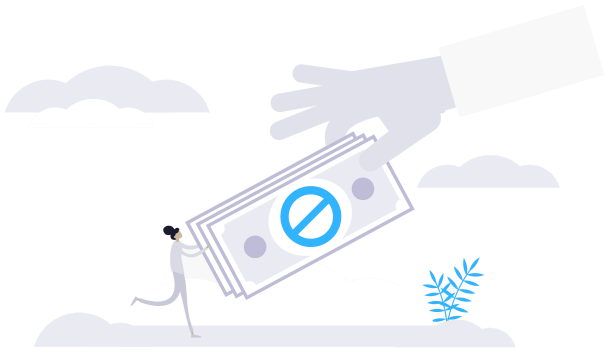- Free online bond quote
- Outstanding rates
- Supersedeas (appeal) bonds across the U.S.
- Easy and quick application process
How Do I Get My Bond?
Start Your Application
Fill out the online application form
Receive your free quote
You will be sent your quote in minutes
Buy Your Surety Bond?
We offer secure payment options

Supersedeas (Appeal) Bonds Explained
A supersedeas bond, which is often referred to as an appeal bond, is a kind of surety bond that is required in certain court cases. When an individual or an entity is appealing a judgment to a higher court, the bond ensures that the appellant will not evade financial responsibility for the initial court decision, if the appeal fails.
Surety bonds work like a contractual agreement between three parties. The principal is the entity that needs to post the bond, the appellant. The obligee in this case is the respective court. The surety is the bond provider that backs up the principal.
The appeal bond is one of the main types of court bonds. It guarantees the financial strength and trustworthiness of litigants appealing court judgments, protects courts from plaintiffs that break their financial obligations under the bond, and ensures compliance with court decisions.
Questions about Court Bonds/appeal Bonds
Who needs to obtain this bond?
A variety of individuals and entities might have to post a supersedeas bonds in relation with appealing a court decision to a higher authority. The appeal cannot be made before they fulfill this requirement. Both federal and state courts can require the posting of an appeal bond.
This prevents misuse of the appellate system and reduces the burden from fake or manipulative appeals. In case the appeal does not succeed, the appellant is thus guaranteed to pay the financial costs of the first court ruling.
Are there different types of supersedeas bonds?
There’s only one kind of supersedeas bond, so you don’t need to worry about choosing the right kind when obtaining it.
How much does the bonding cost?
The cost of an appeal bond is set on the basis of individual circumstances when a plaintiff brings a specific case to an appellate court.
Unlike the cost of other surety bonds, the supersedeas bond cost does not depend on the personal credit score of the bond applicant. Because it’s difficult to predict the decisions in court cases, appeal bonds are seen as high-risk. That’s why appellants have to pay at least 100% collateral, which is the initial judgment amount. Other costs and interest can increase this percentage as well.
The purpose of requiring a full collateral, is to discourage abuse of the appeals court system. If litigants just want to extend a judgment or avoid covering financial costs, the high price of making an appeal would persuade them against such a course of action. The collateral is also used to reimburse the court, without financial loss for the surety backing the plaintiff.
Besides the collateral, the plaintiff needs to pay a bond premium, a percentage of the surety bond amount. This amount depends on the specific court case and is usually equal to the financial costs set in the initial court judgment.
Can I get a supersedeas bond with bad credit?
Because of the particularity of supersedeas bonds, there are no special bonding markets for them. Getting an appeal bond is possible only with good finances, so there are no bad credit bonding options. In general, obtaining supersedeas bonds is more difficult and requires a higher financial responsibility on the side of the bond principal.
As supersedeas bonds are high-risk surety bonds, the minimum requirement for 100% collateral is in force. Appeal bond applicants should thus prepare to cover these costs to get bonded.
How do I get this bond?
In order to apply and buy your appeal bond, you need to do the following:
-
Fill them out and send them to [email protected] or fax them to (267)-362-4817.
For a detailed overview of the bonding process, make sure to review our How to Get Bonded page.
Have further questions? You can get in touch with our bonding experts by calling us at (877) 514-5146.
.
What happens in case of a bond claim?
A claim can be made against your supersedeas bond if you do not cover the costs on the initial court judgment, which has remained after the appeal that you brought. The collateral that you provided when getting bonded can be used to fulfill your financial responsibility to the court.
The costs on proven claims always remain the liability of the bonded party. Thus, when you obtain an appeal bond, it does not protect you, but rather guarantees you will abide by the decision of the court.
About Us

Still Have Questions? Check Our FAQ Pages
What Our Clients Have To Say?
Quick response times and turn around for issuing bonds. Great customer service and very knowledgeable. We have used Lance Surety multiple times and have never been disappointed. Highly recommend them and Collette!
Long story short, these guys cut through the B.S. and get the job done. Responsiveness, excellent! Communication, excellent! Respect for their industry partners, excellent! John, Collette, Ryan, you're all-stars! Thank you!
We decided for Lance Surety Bond's quote for 2 reasons; Price and Customer Service. Our Representative Ryan was just SUPERB!! [...] I highly recommend Lance Surety Bond for all your Bonding needs! I'll definitely come back for all of mine. :-) Thanks Ryan!
Quick response times and turn around for issuing bonds. Great customer service and very knowledgeable. We have used Lance Surety multiple times and have never been disappointed. Highly recommend them and Collette!
Long story short, these guys cut through the B.S. and get the job done. Responsiveness, excellent! Communication, excellent! Respect for their industry partners, excellent! John, Collette, Ryan, you're all-stars! Thank you!
We decided for Lance Surety Bond's quote for 2 reasons; Price and Customer Service. Our Representative Ryan was just SUPERB!! [...] I highly recommend Lance Surety Bond for all your Bonding needs! I'll definitely come back for all of mine. :-) Thanks Ryan!





